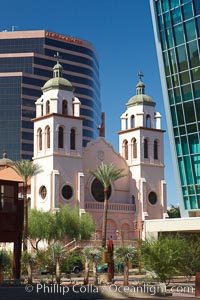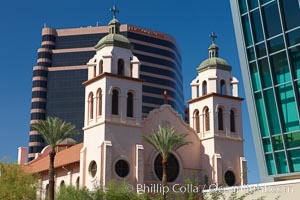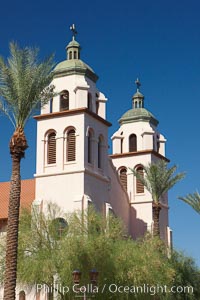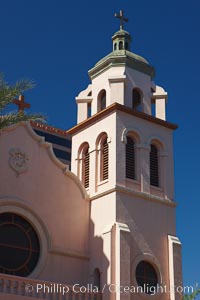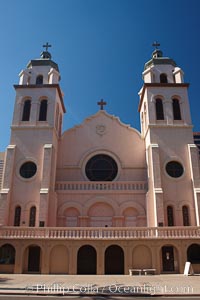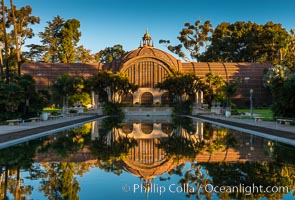
The Botanical Building in Balboa Park, San Diego. The Botanical Building, at 250 feet long by 75 feet wide and 60 feet tall, was the largest wood lath structure in the world when it was built in 1915 for the Panama-California Exposition. The Botanical Building, located on the Prado, west of the Museum of Art, contains about 2,100 permanent tropical plants along with changing seasonal flowers. The Lily Pond, just south of the Botanical Building, is an eloquent example of the use of reflecting pools to enhance architecture. The 193' by 43' foot pond and smaller companion pool were originally referred to as Las Lagunas de las Flores (The Lakes of the Flowers) and were designed as aquatic gardens. The pools contain exotic water lilies and lotus which bloom spring through fall.
Location: Balboa Park, San Diego, California
Image ID: 28823
Location: Balboa Park, San Diego, California
Image ID: 28823
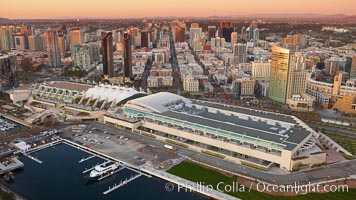
San Diego Convention Center, located in the Marina District of downtown San Diego. Built in 1989, the San Diego Convention Center offers 525,700 square feet of exhibit space. It is noted for its distinctive "sails" made of Teflon-coated fiberglass suspended over the central exhibition hall, aptly named Sails Pavilion.
Location: San Diego, California
Image ID: 22290
Location: San Diego, California
Image ID: 22290
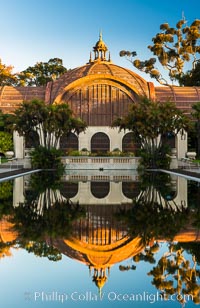
The Botanical Building in Balboa Park, San Diego. The Botanical Building, at 250 feet long by 75 feet wide and 60 feet tall, was the largest wood lath structure in the world when it was built in 1915 for the Panama-California Exposition. The Botanical Building, located on the Prado, west of the Museum of Art, contains about 2,100 permanent tropical plants along with changing seasonal flowers. The Lily Pond, just south of the Botanical Building, is an eloquent example of the use of reflecting pools to enhance architecture. The 193' by 43' foot pond and smaller companion pool were originally referred to as Las Lagunas de las Flores (The Lakes of the Flowers) and were designed as aquatic gardens. The pools contain exotic water lilies and lotus which bloom spring through fall.
Location: Balboa Park, San Diego, California
Image ID: 28822
Location: Balboa Park, San Diego, California
Image ID: 28822
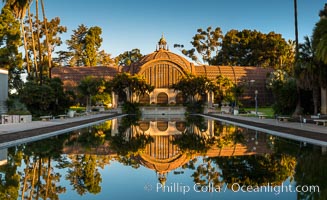
The Botanical Building in Balboa Park, San Diego. The Botanical Building, at 250 feet long by 75 feet wide and 60 feet tall, was the largest wood lath structure in the world when it was built in 1915 for the Panama-California Exposition. The Botanical Building, located on the Prado, west of the Museum of Art, contains about 2,100 permanent tropical plants along with changing seasonal flowers. The Lily Pond, just south of the Botanical Building, is an eloquent example of the use of reflecting pools to enhance architecture. The 193' by 43' foot pond and smaller companion pool were originally referred to as Las Lagunas de las Flores (The Lakes of the Flowers) and were designed as aquatic gardens. The pools contain exotic water lilies and lotus which bloom spring through fall.
Location: Balboa Park, San Diego, California
Image ID: 28824
Panorama dimensions: 6045 x 9876
Location: Balboa Park, San Diego, California
Image ID: 28824
Panorama dimensions: 6045 x 9876
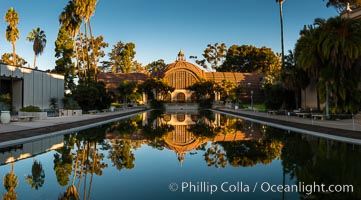
The Botanical Building in Balboa Park, San Diego. The Botanical Building, at 250 feet long by 75 feet wide and 60 feet tall, was the largest wood lath structure in the world when it was built in 1915 for the Panama-California Exposition. The Botanical Building, located on the Prado, west of the Museum of Art, contains about 2,100 permanent tropical plants along with changing seasonal flowers. The Lily Pond, just south of the Botanical Building, is an eloquent example of the use of reflecting pools to enhance architecture. The 193' by 43' foot pond and smaller companion pool were originally referred to as Las Lagunas de las Flores (The Lakes of the Flowers) and were designed as aquatic gardens. The pools contain exotic water lilies and lotus which bloom spring through fall.
Location: Balboa Park, San Diego, California
Image ID: 28825
Panorama dimensions: 6838 x 12347
Location: Balboa Park, San Diego, California
Image ID: 28825
Panorama dimensions: 6838 x 12347
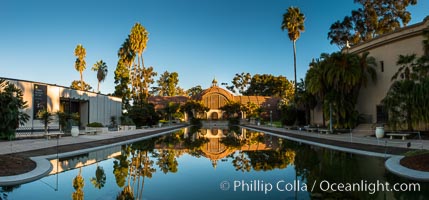
The Botanical Building in Balboa Park, San Diego. The Botanical Building, at 250 feet long by 75 feet wide and 60 feet tall, was the largest wood lath structure in the world when it was built in 1915 for the Panama-California Exposition. The Botanical Building, located on the Prado, west of the Museum of Art, contains about 2,100 permanent tropical plants along with changing seasonal flowers. The Lily Pond, just south of the Botanical Building, is an eloquent example of the use of reflecting pools to enhance architecture. The 193' by 43' foot pond and smaller companion pool were originally referred to as Las Lagunas de las Flores (The Lakes of the Flowers) and were designed as aquatic gardens. The pools contain exotic water lilies and lotus which bloom spring through fall.
Location: Balboa Park, San Diego, California
Image ID: 28826
Panorama dimensions: 5475 x 11746
Location: Balboa Park, San Diego, California
Image ID: 28826
Panorama dimensions: 5475 x 11746
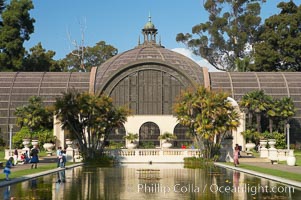
The Botanical Building in Balboa Park, San Diego. The Botanical Building, at 250 feet long by 75 feet wide and 60 feet tall, was the largest wood lath structure in the world when it was built in 1915 for the Panama-California Exposition. The Botanical Building, located on the Prado, west of the Museum of Art, contains about 2,100 permanent tropical plants along with changing seasonal flowers. The Lily Pond, just south of the Botanical Building, is an eloquent example of the use of reflecting pools to enhance architecture. The 193 by 43 foot pond and smaller companion pool were originally referred to as Las Lagunas de las Flores (The Lakes of the Flowers) and were designed as aquatic gardens. The pools contain exotic water lilies and lotus which bloom spring through fall. Balboa Park, San Diego.
Location: Balboa Park, San Diego, California
Image ID: 14578
Location: Balboa Park, San Diego, California
Image ID: 14578
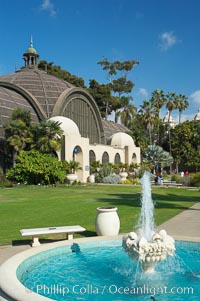
The Botanical Building in Balboa Park, San Diego. The Botanical Building, at 250 feet long by 75 feet wide and 60 feet tall, was the largest wood lath structure in the world when it was built in 1915 for the Panama-California Exposition. The Botanical Building, located on the Prado, west of the Museum of Art, contains about 2,100 permanent tropical plants along with changing seasonal flowers. The Lily Pond, just south of the Botanical Building, is an eloquent example of the use of reflecting pools to enhance architecture. The 193 by 43 foot pond and smaller companion pool were originally referred to as Las Lagunas de las Flores (The Lakes of the Flowers) and were designed as aquatic gardens. The pools contain exotic water lilies and lotus which bloom spring through fall. Balboa Park, San Diego.
Location: Balboa Park, San Diego, California
Image ID: 14582
Location: Balboa Park, San Diego, California
Image ID: 14582
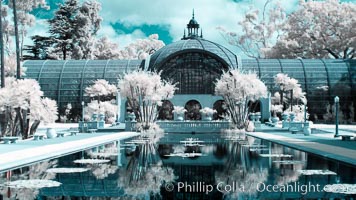
The Botanical Building in Balboa Park, San Diego. The Botanical Building, at 250 feet long by 75 feet wide and 60 feet tall, was the largest wood lath structure in the world when it was built in 1915 for the Panama-California Exposition. The Botanical Building, located on the Prado, west of the Museum of Art, contains about 2,100 permanent tropical plants along with changing seasonal flowers. The Lily Pond, just south of the Botanical Building, is an eloquent example of the use of reflecting pools to enhance architecture. The 193 by 43 foot pond and smaller companion pool were originally referred to as Las Lagunas de las Flores (The Lakes of the Flowers) and were designed as aquatic gardens. The pools contain exotic water lilies and lotus which bloom spring through fall.
Location: Balboa Park, San Diego, California
Image ID: 23096
Location: Balboa Park, San Diego, California
Image ID: 23096
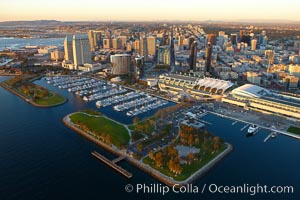
San Diego Embarcadero Marina Park, with yacht basin, San Diego Convention Center (right), Marriott (center) and Grand Hyatt (left) hotels.
Location: San Diego, California
Image ID: 22330
Location: San Diego, California
Image ID: 22330
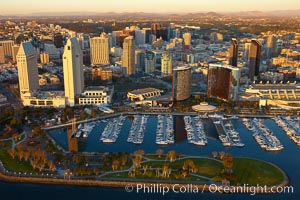
Embarcadero Marina Park, with the Grand Hyatt (left) and Marriott (right) hotels rising above the yacht basin.
Location: San Diego, California
Image ID: 22367
Location: San Diego, California
Image ID: 22367
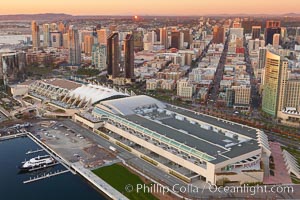
San Diego Convention Center, located in the Marina District of downtown San Diego. Built in 1989, the San Diego Convention Center offers 525,700 square feet of exhibit space. It is noted for its distinctive "sails" made of Teflon-coated fiberglass suspended over the central exhibition hall, aptly named Sails Pavilion.
Location: San Diego, California
Image ID: 22369
Location: San Diego, California
Image ID: 22369
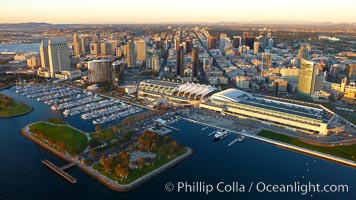
San Diego Embarcadero Marina Park, with yacht basin, San Diego Convention Center (right), Marriott (center) and Grand Hyatt (left) hotels.
Location: San Diego, California
Image ID: 22387
Location: San Diego, California
Image ID: 22387
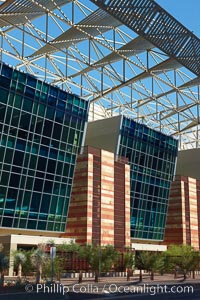
Phoenix Convention Center. Originally built in 1972 and expanded in 1985 and the mid-90's, the Phoenix Convention center offers 300,000 square feet of space for conventions year round. It's exterior is a mix of modern glass, metal and stone architecture.
Location: Phoenix Convention Center, Arizona
Image ID: 23175
Location: Phoenix Convention Center, Arizona
Image ID: 23175
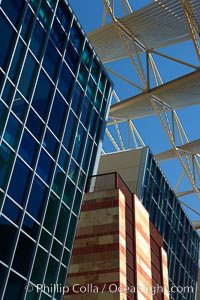
Phoenix Convention Center. Originally built in 1972 and expanded in 1985 and the mid-90's, the Phoenix Convention center offers 300,000 square feet of space for conventions year round. It's exterior is a mix of modern glass, metal and stone architecture.
Location: Phoenix Convention Center, Arizona
Image ID: 23179
Location: Phoenix Convention Center, Arizona
Image ID: 23179
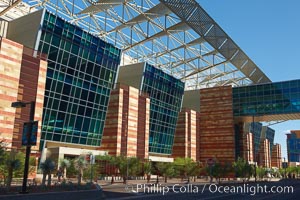
Phoenix Convention Center. Originally built in 1972 and expanded in 1985 and the mid-90's, the Phoenix Convention center offers 300,000 square feet of space for conventions year round. It's exterior is a mix of modern glass, metal and stone architecture.
Location: Phoenix Convention Center, Arizona
Image ID: 23184
Location: Phoenix Convention Center, Arizona
Image ID: 23184
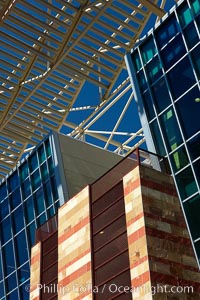
Phoenix Convention Center. Originally built in 1972 and expanded in 1985 and the mid-90's, the Phoenix Convention center offers 300,000 square feet of space for conventions year round. It's exterior is a mix of modern glass, metal and stone architecture.
Location: Phoenix Convention Center, Arizona
Image ID: 23189
Location: Phoenix Convention Center, Arizona
Image ID: 23189
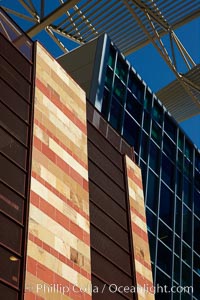
Phoenix Convention Center. Originally built in 1972 and expanded in 1985 and the mid-90's, the Phoenix Convention center offers 300,000 square feet of space for conventions year round. It's exterior is a mix of modern glass, metal and stone architecture.
Location: Phoenix Convention Center, Arizona
Image ID: 23192
Location: Phoenix Convention Center, Arizona
Image ID: 23192
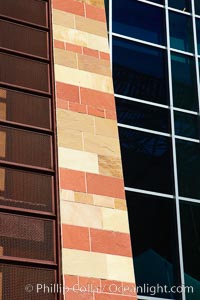
Phoenix Convention Center. Originally built in 1972 and expanded in 1985 and the mid-90's, the Phoenix Convention center offers 300,000 square feet of space for conventions year round. It's exterior is a mix of modern glass, metal and stone architecture.
Location: Phoenix Convention Center, Arizona
Image ID: 23196
Location: Phoenix Convention Center, Arizona
Image ID: 23196
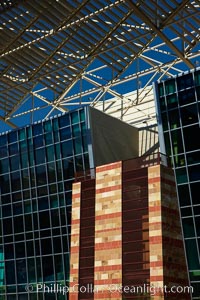
Phoenix Convention Center. Originally built in 1972 and expanded in 1985 and the mid-90's, the Phoenix Convention center offers 300,000 square feet of space for conventions year round. It's exterior is a mix of modern glass, metal and stone architecture.
Location: Phoenix Convention Center, Arizona
Image ID: 23197
Location: Phoenix Convention Center, Arizona
Image ID: 23197
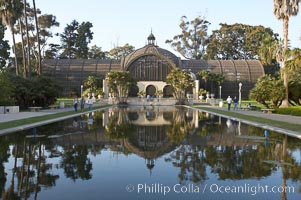
The Botanical Building in Balboa Park, San Diego. The Botanical Building, at 250 feet long by 75 feet wide and 60 feet tall, was the largest wood lath structure in the world when it was built in 1915 for the Panama-California Exposition. The Botanical Building, located on the Prado, west of the Museum of Art, contains about 2,100 permanent tropical plants along with changing seasonal flowers. The Lily Pond, just south of the Botanical Building, is an eloquent example of the use of reflecting pools to enhance architecture. The 193 by 43 foot pond and smaller companion pool were originally referred to as Las Lagunas de las Flores (The Lakes of the Flowers) and were designed as aquatic gardens. The pools contain exotic water lilies and lotus which bloom spring through fall. Balboa Park, San Diego.
Location: Balboa Park, San Diego, California
Image ID: 11273
Location: Balboa Park, San Diego, California
Image ID: 11273
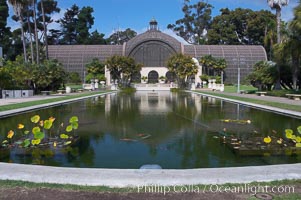
The Botanical Building in Balboa Park, San Diego. The Botanical Building, at 250 feet long by 75 feet wide and 60 feet tall, was the largest wood lath structure in the world when it was built in 1915 for the Panama-California Exposition. The Botanical Building, located on the Prado, west of the Museum of Art, contains about 2,100 permanent tropical plants along with changing seasonal flowers. The Lily Pond, just south of the Botanical Building, is an eloquent example of the use of reflecting pools to enhance architecture. The 193 by 43 foot pond and smaller companion pool were originally referred to as Las Lagunas de las Flores (The Lakes of the Flowers) and were designed as aquatic gardens. The pools contain exotic water lilies and lotus which bloom spring through fall. Balboa Park, San Diego.
Location: Balboa Park, San Diego, California
Image ID: 14575
Location: Balboa Park, San Diego, California
Image ID: 14575
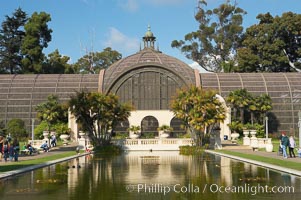
The Botanical Building in Balboa Park, San Diego. The Botanical Building, at 250 feet long by 75 feet wide and 60 feet tall, was the largest wood lath structure in the world when it was built in 1915 for the Panama-California Exposition. The Botanical Building, located on the Prado, west of the Museum of Art, contains about 2,100 permanent tropical plants along with changing seasonal flowers. The Lily Pond, just south of the Botanical Building, is an eloquent example of the use of reflecting pools to enhance architecture. The 193 by 43 foot pond and smaller companion pool were originally referred to as Las Lagunas de las Flores (The Lakes of the Flowers) and were designed as aquatic gardens. The pools contain exotic water lilies and lotus which bloom spring through fall. Balboa Park, San Diego.
Location: Balboa Park, San Diego, California
Image ID: 14576
Location: Balboa Park, San Diego, California
Image ID: 14576
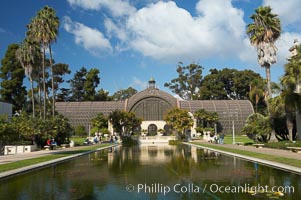
The Botanical Building in Balboa Park, San Diego. The Botanical Building, at 250 feet long by 75 feet wide and 60 feet tall, was the largest wood lath structure in the world when it was built in 1915 for the Panama-California Exposition. The Botanical Building, located on the Prado, west of the Museum of Art, contains about 2,100 permanent tropical plants along with changing seasonal flowers. The Lily Pond, just south of the Botanical Building, is an eloquent example of the use of reflecting pools to enhance architecture. The 193 by 43 foot pond and smaller companion pool were originally referred to as Las Lagunas de las Flores (The Lakes of the Flowers) and were designed as aquatic gardens. The pools contain exotic water lilies and lotus which bloom spring through fall. Balboa Park, San Diego.
Location: Balboa Park, San Diego, California
Image ID: 14577
Location: Balboa Park, San Diego, California
Image ID: 14577
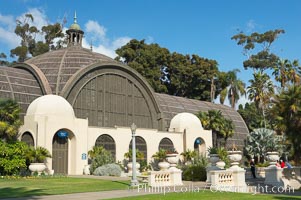
The Botanical Building in Balboa Park, San Diego. The Botanical Building, at 250 feet long by 75 feet wide and 60 feet tall, was the largest wood lath structure in the world when it was built in 1915 for the Panama-California Exposition. The Botanical Building, located on the Prado, west of the Museum of Art, contains about 2,100 permanent tropical plants along with changing seasonal flowers. The Lily Pond, just south of the Botanical Building, is an eloquent example of the use of reflecting pools to enhance architecture. The 193 by 43 foot pond and smaller companion pool were originally referred to as Las Lagunas de las Flores (The Lakes of the Flowers) and were designed as aquatic gardens. The pools contain exotic water lilies and lotus which bloom spring through fall. Balboa Park, San Diego.
Location: Balboa Park, San Diego, California
Image ID: 14579
Location: Balboa Park, San Diego, California
Image ID: 14579
